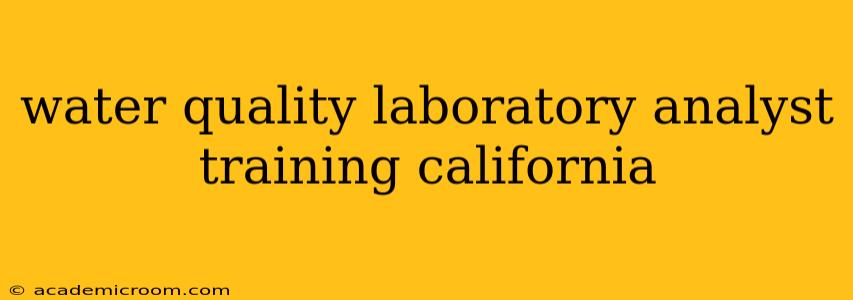California's robust environmental regulations necessitate a highly skilled workforce in water quality analysis. Aspiring water quality laboratory analysts in California have several avenues to pursue comprehensive training, leading to rewarding careers in environmental protection. This guide will explore the various training options available, licensing requirements, and career prospects within this crucial field.
What are the different types of training available for water quality laboratory analysts in California?
Several pathways lead to becoming a qualified water quality laboratory analyst in California. These include:
-
Associate's and Bachelor's Degrees: Many community colleges and universities offer associate's and bachelor's degrees in environmental science, chemistry, or biology with a focus on water quality analysis. These programs provide a strong foundation in scientific principles and laboratory techniques. Look for programs accredited by relevant agencies for assurance of quality.
-
Certificates and Vocational Training Programs: Shorter-term certificate programs focusing specifically on water quality analysis techniques are offered by community colleges and vocational schools. These programs are ideal for individuals already possessing a science background who wish to specialize in this area. They often offer hands-on laboratory experience.
-
On-the-Job Training: Some laboratories offer on-the-job training, allowing individuals to learn practical skills while working under the supervision of experienced analysts. This approach often complements formal education and certification. However, it's crucial to ensure adequate supervision and training in safe laboratory practices.
-
Continuing Education Courses: Continuous professional development is crucial. Many organizations offer continuing education courses focusing on specific analytical techniques, new regulations, or emerging technologies in water quality analysis. These courses keep analysts updated with the latest industry standards and best practices.
What certifications are required for water quality laboratory analysts in California?
While a specific state license isn't always mandatory for all water quality laboratory analyst positions in California, certification significantly enhances career prospects and demonstrates competency. Relevant certifications include:
-
American Water Works Association (AWWA) certifications: AWWA offers various certifications related to water treatment and analysis, showcasing expertise in specific areas.
-
National Environmental Health Association (NEHA) certifications: NEHA provides certifications relevant to environmental health, including those focusing on laboratory techniques and water quality.
-
Specific laboratory certifications: Some laboratories might require or prefer analysts to have certifications specific to the instruments or methods employed within their facility.
What are the job prospects for water quality laboratory analysts in California?
California's commitment to environmental protection ensures strong demand for skilled water quality laboratory analysts. Job prospects are positive, especially for those possessing a combination of formal education, relevant certifications, and practical laboratory experience. Potential employers include:
-
Government agencies (e.g., State Water Resources Control Board, regional water quality control boards): These agencies play a critical role in monitoring and regulating water quality.
-
Environmental consulting firms: These firms assist businesses and government agencies in complying with environmental regulations.
-
Municipal water treatment plants: These facilities require analysts to ensure the quality and safety of drinking water.
-
Private laboratories: Independent laboratories provide testing services to a wide range of clients.
What are the typical tasks of a water quality laboratory analyst in California?
A water quality laboratory analyst in California performs a variety of crucial tasks, including:
-
Collecting and preparing water samples: This involves adhering to strict protocols to maintain sample integrity.
-
Performing various analytical tests: This could include chemical, biological, and physical analyses, using a range of laboratory equipment.
-
Interpreting results and preparing reports: This necessitates a sound understanding of water quality standards and regulations.
-
Maintaining laboratory equipment and ensuring quality control: Proper maintenance and calibration are critical for accurate results.
-
Adhering to safety regulations and best practices: Laboratory safety is paramount.
How much does a water quality laboratory analyst make in California?
Salaries for water quality laboratory analysts in California vary depending on factors such as experience, education, certification, and employer. However, competitive salaries are offered, reflecting the importance of this profession. It's advisable to research current salary data through online resources like Indeed, Glassdoor, or Salary.com to gain a more precise understanding of salary ranges in specific regions of California.
This comprehensive guide offers a starting point for those interested in pursuing a career as a water quality laboratory analyst in California. Remember to research specific educational institutions, certification programs, and potential employers to tailor your path to your individual career goals.
